MQA: Sonic Degradation and Huge Losses
I haven’t written about MQA for a while. But a couple of recent articles and some information from a reader make an update timely. I’ve ceased reading or posting comments on FB groups dedicated to MQA or with threads about the process because discussing the science behind it in the hopes of convincing audiophiles that it has no merit is about as successful as convincing a flat Earther (one of my former tenants believes the Earth is flat, so I have some experience in this area) that they live on a sphere. The Q&A section on the MQA website is full of untrue statements and spin. For example, “Inside the file, MQA is very different: the audio data is higher resolution; it’s cleverly packed and designed to preserve and confirm that you get full Master Quality, wherever you listen.” However, they don’t tell you that it’s impossible that the MQA has “higher resolution” than the original master file. And what is “Master Quality?” Isn’t the master the file they get from the labels BEFORE the MQA is applied? Claiming “Master Quality” is like saying MP3 encoding is “CD Quality.” Either you get to hear the original master file provided by the record label or not. Master Quality is a marketing term dreamed up by the professionals at MQA.
MQA is so dangerous to the recording industry that I dedicated an entire chapter of Music and Audio: A User Guide to Better Sound to MQA. Titled “MQA: A Solution To What?,” I included discussions of the technical failings of the process and the fact that “folding ultrasonics” doesn’t matter if the original masters don’t have any ultrasonics to begin with. There were sections provided by designers and audio engineers confirming my analysis of MQA. The book also included a lengthy interview with the format’s inventor Robert Stuart, who I have considered a friend and supporter ever since I started recording and releasing high-resolution recordings. Bob was very impressed with my work and even gifted me a couple of very expensive Meridian components years ago. But his efforts to create an MQA-only streaming music world is misplaced and dangerous. And it seems largely motivated by money not fidelity enhancement.
Neil Young Explains Why He’s Not On TIDAL
On January 3, 2021, Neil Young authored and posted an article on his NYA Times-Contrarian webpage titled, “TIDAL MISLEADING LISTENERS“. The all caps are his, not mine. If you haven’t read it, you should. Neil is not one to mince words. And while I have been critical of his mission to save “high-quality music,” his conclusions about MQA are spot on.
Here are couple of quotes from the article:
“TIDAL is calling their files of my songs Masters. But TIDAL’s MQA files are not my masters. I make my masters – not TIDAL. I made my masters the way I wanted them to sound. If TIDAL referred to their titles as TIDAL MASTERS, I would have no problem, but they don’t. They call them Masters. I had my music removed from that platform. They are not my masters.”
EDITOR’S NOTE: MQA claims, “…you get exactly what the creators intended,” is patently false! You get what MQA or TIDAL decides sounds “better.”
“Tidal’s master is a degradation of the original to make it fit in a box that collects royalties.”
MQA is the company supplying technology to TIDAL. In their own official descriptions they go into what they did to my original files. They altered them and charge a royalty. I feel that my master files are in no way improved. They are degraded and manipulated. I made them. I know the difference. I can hear it.
Neil Young
I support Neil’s efforts to avoid MQA at all costs and require that TIDAL remove his catalog from their site. And while I realize Mr. Young’s catalog means a whole lot more to TIDAL than my 75 AIX Records albums, I also insisted that TIDAL remove my albums from their site because they applied the MQA lossy, DRM codec to my files without my knowledge. I authorized my distributor to make my albums available for streaming but I did not consent to them being degraded by the MQA methodology. I want music lovers that enjoy my recordings to hear them the way I intended NOT with the MQA process. I believe that if more artists understood what the labels are allowing MQA and the streaming companies to do to their art, they would require them to be removed as well.
The most dangerous part of the MQA quest to rule the audio world is that the original high-resolution masters won’t be available to listeners. The labels and MQA generate more profits but fidelity diminishes. And don’t forget we all get to pay for the licenses and royalties that MQA collects from hardware companies and streaming providers. I will never purchase a piece of equipment from a manufacturer that fell for the MQA nonsense and added their process and logo to their DACs or players. I can only hope that audiophiles that research the realities of the format avoid these companies as well.
Dollars and Nonsense
Don’t think it’s all about maximizing return on investment and profits (if they ever get there)? Companies like TIDAL and nugs.net are charging a hefty premium for content encoded with MQA. Take a look at the following chart taken from the nugs.net site. The cost of the MQA encoded format is twice the cost of the MP3 and $2.00 more than a lossless “HD” version encoded using FLAC. Give me the “HD” FLAC version. FLAC is an excellent codec, it’s FREE, and lossless. In fact, MQA “comes is a lossless FLAC file.” Why pay more for something you can get for free?
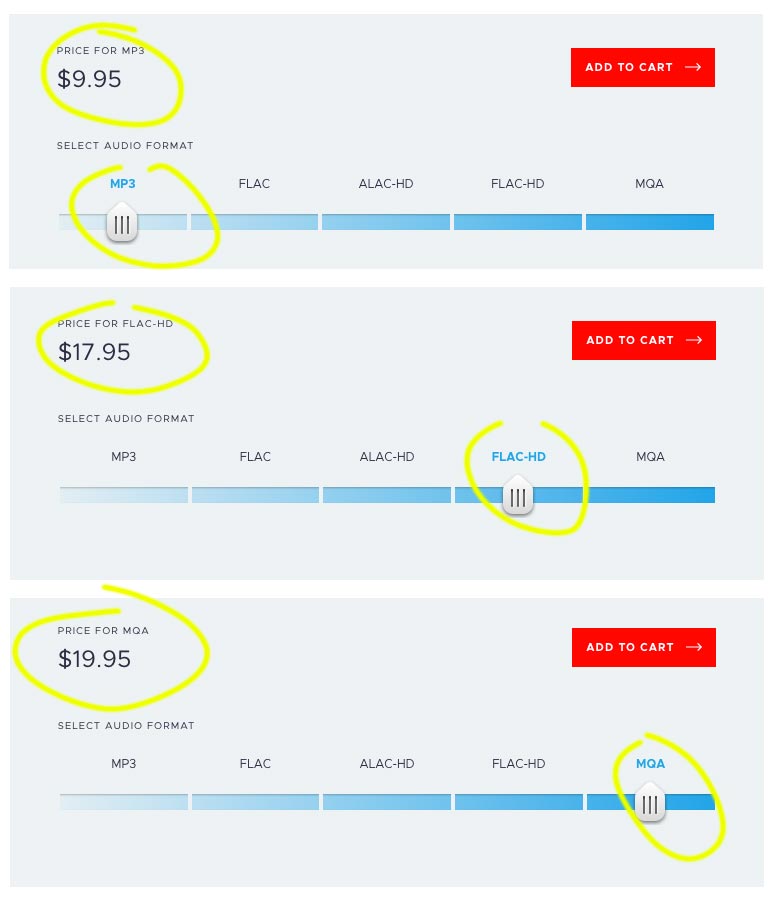
A Pretty Dismal Profit and Loss Statement
I have always had a great deal of respect for Bob Stuart until he started pushing MQA. He IS brilliant and done a great deal to elevate digital audio in the audiophile world but he’s not equally talented in building a business. But he lost me with his insistence that MQA was going to be the savior of music in any digital format. In fact, the hope is that MQA will be the savior of Meridian Audio and reap huge profits one micro dollar at a time for the new MQA Limited company and its investors. MLP (Meridian Lossless Packing) was chosen as the lossless codec for the now defunct DVD-Audio format back in 2000. MLP was sold to Dolby some years later and rebranded as Dolby TrueHD, which is one of the two lossless codecs for Blu-ray discs. However, I believe the codec was held back for the emerging area of audio streaming. Bob Stuart was absolutely correct about the coming obsolescence of physical media. The era of streaming audio—in “so-called” high-resolution audio—has arrived. Would you invest in a compression scheme used to deliver “master quality audio” via every distribution format currently available including streaming, broadcast, and even physical discs (yes, you can purchase MQA encoded CDs!)?
Several years ago. I was shown a table that confirmed Meridian had been losing large sums of money for a while. Despite marketing and selling very pricey hardware, they had lost tens of millions of dollars over the preceding 15 years. As I recall, the amount was somewhere around $48 million. If you were in charge of a company flushing that kind of money down the toilet, you might use a little hyperbole when discussing your latest venture (MQA) to trying the stop the bleeding. I hope that MQA fails miserably and is relegated to the dust bin of failed audio technologies. It is not good for the industry. It is not good for fidelity. And it’s not good for music reproduction. The only thing MQA is good for is MQA Limited, Bob Stuart, and its investors.
I was provided an updated financial analysis of Meridian Audio Limited and MQA Limited recently by a reader. When I inquired about his statement that Meridian and MQA had lost $100 Million, he replied, “The numbers are from audited financial statements available at Companies House website. Meridian’s numbers stop in 2017 because Bob Stuart left the board. Note: These numbers do not include the sale of intellectual property like MLP and the sale of MQA. They are just operations. I circulated these numbers in 2018. At the current exchange rate, 71,333,839 and a smaller than normal loss estimate for 2020 (2.3 million pound loss) gets me to $100 million dollar loss.
Let’s hope that the companies financial woes continue and the music we enjoy will be available without their destructive process. No well-heeled company should be able to buy their way into monopolizing an audio format. Streaming or downloading the original digital master is actually what the artist, engineers, and producer want you to hear! And it’s what we should demand!
Happy New Year Book Discount!
I’ve been spending a few hours everyday working on the new book. For those interested in my previous book, the 880-page, 4 pound Music and Audio: A User Guide to Better Sound, I’m offered a 50% discount off the paperback book with or without the blu-ray disc. Use coupon code HappyNewYear50 during check out. This coupon will be valid until March 1, 2021. Thanks for your interest.

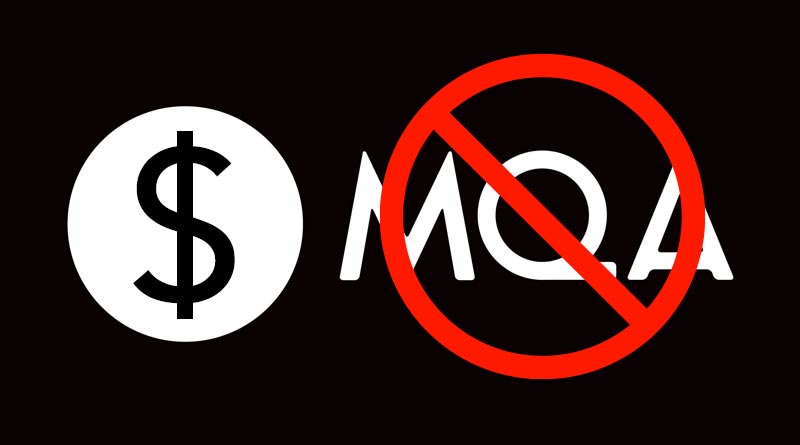
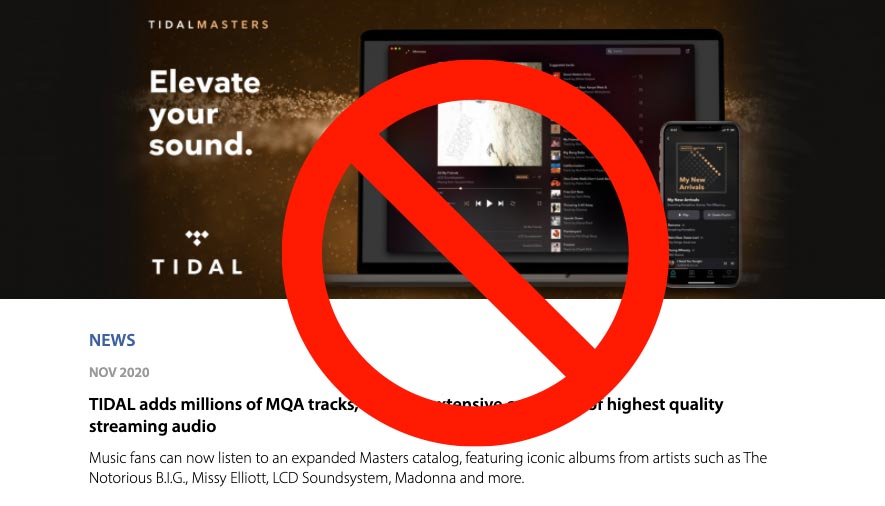
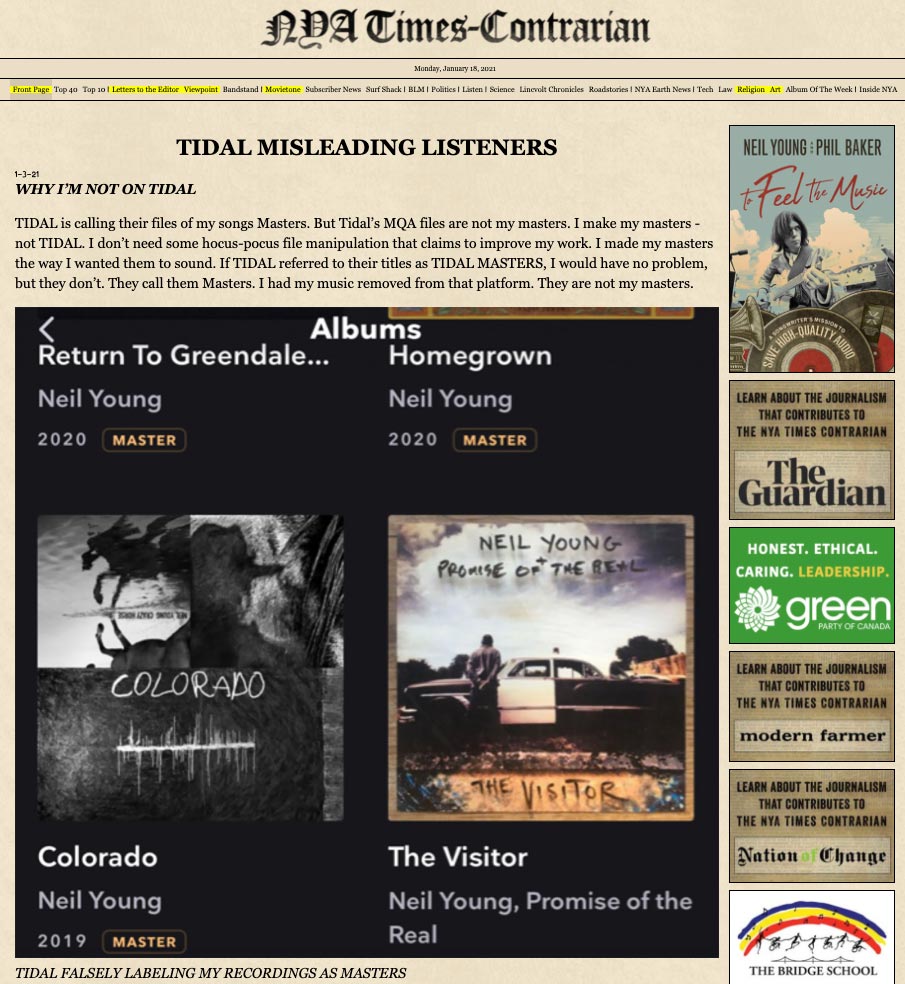
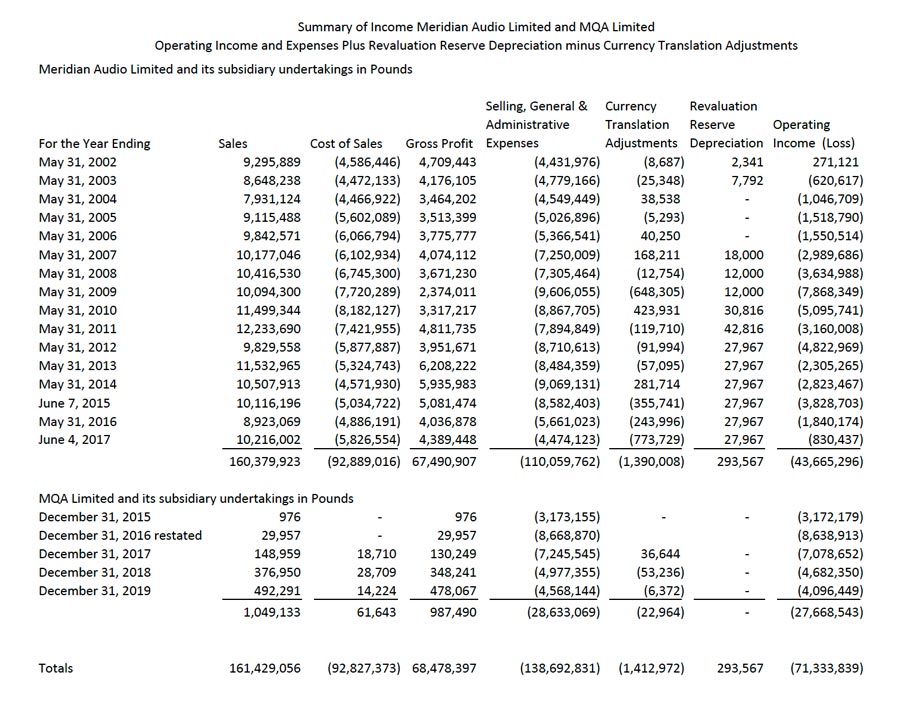
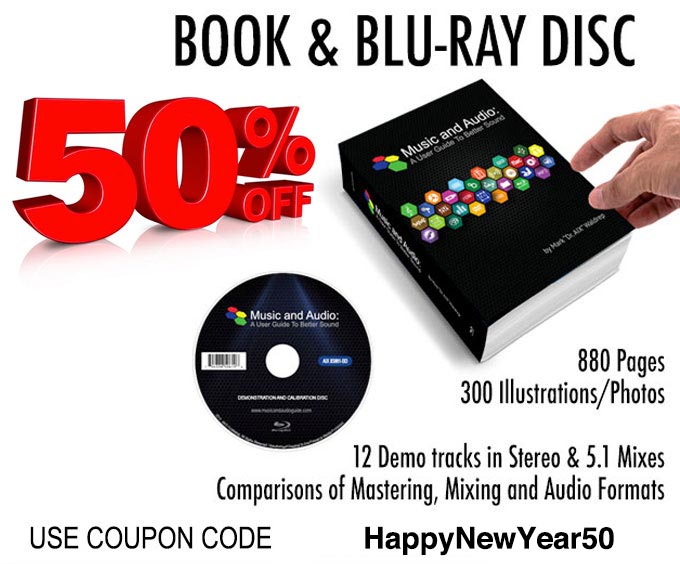
Dr AIX, I find your article interesting and would add a couple of points.
Bandwidth for a lot of the rural fly-over states population is still limited and the result is a less than spectacular viewing experience, especially when projected onto a large screen. I know this only too well living in rural Arkansas.
The visual difference between physical media and streamed content can be quite alarming plus I’ve never suffered from “buffering” when playing physical media. But my 4K Netflix picture quality often looks more like badly compressed 480i being upscaled to hell. You can tell from this that I still continue to buy physical media.
But then there’s the counter argument that can be made which for audio is this, given that bandwidth is plentiful and cheap why even bother to compress the audio at all.
The only fact that seems to be missing from the article is does MQA processing result in a significantly smaller file than FLAC. But even so, who really cares?
I’m with you that MQA is a solution looking for a problem, oh and making money from the license fees along the way.
IMO, there is nothing wrong with data compression. Especially for video. There is absolutely no way for data bandwidth to be adequate for uncompressed video including physical discs since they are already always lossy compressed whether DVD/Blu-Ray/UHD. Maybe at some point we can actually see reliable bitrates comparable to Ultra HD BluRay into our homes.
The issue is that audio *already* doesn’t take up huge bandwidth, so lossless compression already can be easily transported across the network.
Furthermore, with little evidence that hi-res beyond 16/44.1 is “needed” to sound good as per Mark’s own blind listening test, there is simply no point to spend so much time, energy for any streaming service to fool around with such things as MQA except for making money in some way. MQA is even not any good as a copy-protection scheme!
As such:
– Honest audiophiles will not be overly excited about hi-res or the hyped advertising it receives.
– Honest streaming services might want to offer a “higher quality” option beyond “standard” high bitrate MP3 320kbps-type quality. All “high quality” should look like is a lossless FLAC 16/44.1. That’s all.
– Honest media/magazines should realize that there is nothing in MQA that improves sound quality. It’s worse than true 24-bit audio and impossible to be better than 88.2+ kHz. MQA-CD is worse than lossless 16/44.1 or just a regular CD! Those are just the facts! MQA as a feature on a DAC is no great badge of honour.
Hopefully audiophiles will just keep it simple and be honest with themselves as well about what is of value in all of this.
Thanks Mark for the ongoing education to the audiophile hobby!
I’m sure it’s not easy to speak truth in ways which the Industry might not appreciate.
Thank you! You are among the very few that deserve the respect and appreciation of audiophiles. In response to my MQA post, I received a private email full of expletives and anger complaining about my own profit-minded posts and promotion. Readers can choose to trust me or not. However, I can assure everyone that the revenue generated by the AIX catalog is not much and never has been. I spent a great of time and resources recording and releasing the AIX Records albums but I chose to do it because I wanted to see if real high-resolution, surround recordings would be “better” than most commercially available albums. I do not operate this website or write to get rich. My teaching, production work, and the ownership of my studio building have sustained me quite comfortably over the years. Without financial incentives and with years of experience, I feel qualified to write and comment on the recording industry and issues important to audiophiles. I literally have nothing to gain by telling the truth. Speaking the truth has not always been easy but I feel obligated to share things that I know.
Hi,
I understand the points in this article but saw some issues that were never mentioned. You get to choose your streaming quality in Tidal such as HiFi which is lossless FLAC 16/44khz and Masters which is the MQA encoded FLAC that plays up to 24/96khz on my non MQA DAC. You never mentioned once if the HiFi version sounded better than the Masters. I mean the option is there to not use MQA and listen to the “CD” stream only, unless you mean the HiFi stream is also further compressed with MQA ? From personal blind testing, I heard slight differences when switching between HiFi/Masters on Tidal and it was generally in favour of Masters. How do you explain this ? For reference I’m only using a Magnepan LRS/Klipsch RP-160M but they are pretty revealing of any changes in my system. Comparing SACDs to Masters would be genuine stuff. But how many artist can we have on SACDs Or even DSD? vs how MQA is providing higher resolution(or supposedly) to the masses instead of the few audiophile communities with money to spare on expensive players and 100s of expensive albums.
The people behind MQA are trying to become the dominant audio encoding format and eliminate ALL other options. They have convinced manufacturers, labels, and broadcasters that their lossy process somehow restores the fidelity of the original masters. It doesn’t. In fact, there are NO benefits to MQA other than to provide the company with a recurring revenue stream. You and others may experience a change in fidelity compared to other formats but you have to realize that you are not comparing apples and apples. Wouldn’t you prefer to have the master that the artist or label approved and NOT the processed version that Robert Stuart or some post approval encoding/streaming service believes is “better?” I own almost 100 high-res masters and I DO NOT WANT them MQA’d because it will diminish the fidelity of the tracks. MQA is NOT higher resolution and should be universally rejected.
MQA can’t work. Audio Origami violates the Shannon Nyquist criteria by 400%. It claims to losslessly stuff a 96 khz file into a 24 khz file by downshifting frequency segments twice and putting them at different voltage levels. As frequency is the inverse of time there simply isn’t enough time for it according to what Shannon and Nyquest said and what the entire telecom and IT industry have accepted as bedrock math and information theory ever since. I always wanted a roomy car that is easy to park, much larger on the inside than it is on the outside. The tests Dr. Waldrep confirm what mainstream science knows and understands, that you can’t hear ultrasonic sounds (they can create problems like distortion in the audible frequency range.) So with MQA you have a solution that doesn’t work for a problem that doesn’t exist.
I have enjoyed Tidal for years. Tidal is recently doing a great job recommending new music based on my likes.
My old ears cannot detect any difference between Masters and Hifi albums.
What I DO NOT LIKE is when I search or albums from an artist (say Dianna Krall) the only options displayed are all “Masters”. If I switch my streaming preference to Hifi, will I still be streaming the Masters tracks, but the Tidal app will skip the “unfolding”. What if I want to hear the original CD 16/44 album?
Tidal has embraced MQA and is not the best service IMHO. I have been listening to Amazon Music HD and Qobus lately.
I am not up on Copyright laws but if they altered your files without your knowledge, can you not sue for copyright infringement?
IMO MQA is nothing but a DRM container sold to the labels by MQA.
I don’t think so and the cost of lawyers always outweighs the upside even if you prevail.
I believe MQA has merit, and no I am not a flat Earther type. I just listen with my ears and form my own conclusions. Some MQA files do sound like crap-there’s no doubt about it. But I was listening tonight to one title from Roger Eno Obsidian in both the FLAC and MQA versions. I mean I get why people feel there is something “missing” and for me that is the very thing that makes me enjoy some MQA titles. I remember some time ago when Harry Pearson of the Absolute Sound was talking about the Jadis 200 tube amp. He talked about an “electronic vail” being lifted from the music, and that is precisely what I hear on the MQA Roger Eno piece. There is an electronic haze that creates a congestion in the sound stage with the FLAC rendition. With the MQA, I there is an immediacy and less “distance” between the music and listener. Hard to describe and quantify because it really is more about the emotional experience.
Everyone hears music differently. If listening to an MQA-encoded files works for you, then far be it for me to argue with you. However, there are lots of others that wish to avoid the lossy, DRM’d MQA hoax and if the companies (MQA and the labels) get their way, we will be forced to listen to MQA on every file. It is clearly not what they say it is. My own recordings were available on TIDAL until I asked for them to be removed (I will not allow my files to be degraded by the MQA process). If MQA claims it references back to the original equipment (ADCs and DACs) in their tweaking and adjustments to make the file “authenticated,” then why didn’t anyone inquire as to my own production path, the equipment the I used, and the specifics of my sonic profile? Because it’s all marketing hype and meant to maximize profits. You can add the same distortions to your files without MQA.
Thank you for not mincing words. I first noticed MQA when I tried a Tidal subscription for half a years (I have since switched to Qobuz for various reasons, not the least of which is that I can buy HD releases for excellent prices there.) I have tried back and forth to find any reasonable explanation what advantage MQA could possibly have over already existing formats, such as FLAC/ALAC, which provide already what MQA claims to provide without the need of proprietary interference. Even on sites promoting MQA I could not quite understand what exactly the advantage of MQA should be, that tells you something. A lot of talk about “folding” sound into bits and bytes, but it just doesn’t really say what the advantage should be over just having the “real” sound file/master in FLAC/ALAC format. (The one possible advantage might be smaller file size for high-res files, but that is no longer an issue these days for me.)
I came across this site researching MQA, and confirmed my bias against it.